Space Corps of the People's Liberation Army
The Space Corps of the People's Liberation Army ( Chinese 中國人民解放軍 航天 員 大隊 / 中国人民解放军 航天 员 大队 , Pinyin Zhōnggúo Rénmín Jiěfàngjūn Hángtiānyuán Dàduì ) is a unit of the People's Liberation Army stationed in Beijing , which has been subordinate to the Space Department of the Strategic Combat Support Force since 2017 . It organizes the space travelers , who until 2018 came exclusively from the Air Forces of the People's Republic of China . However, selection and training of astronauts found in astronaut training center of the Department of weapons development of the Central Military Commission instead. The commander of the space corps has been Major General Nie Haisheng , who himself has completed two space flights, since February 2016 .
history
On 21 September 1992 has been prepared by the Political Bureau of the Chinese Communist Party Standing Committee , the manned space program of the People's Republic of China approved, named for the date and "Project 921". There one dealt first with the fundamental problems in the construction of a spaceship . In August 1995, however, General Ding Henggao, the commander of the space program, filed a report with the Central Military Commission proposing to select candidates for future space travelers from among the active pilots in the Chinese Air Force. General Ding had asked in the report for instructions on how to proceed with the matter. A month later, in September 1995, the military commission headed by Jiang Zemin at the time received a written response that the proposal was approved.
As a result of the astronaut selection process in the 1970/71 Shuguang project, the Research Institute of Space Medicine and Technology , the predecessor organization of the Chinese Astronaut Training Center, already had a wealth of experience in this area. Even if the actual Shuguang spaceship never got beyond a model made of wood and cardboard, the personnel files of the spacemen selected at the time, who all enjoyed a long and healthy life despite the resumption of regular fighter pilot activities, showed that the standards applied at the time were absolute were right. On this basis, the space medicine specialists have now defined the following criteria:
- Strength of will
- Self-sacrifice
- Sociability and tolerance
- Height 1.60 m to 1.72 m
- Weight 55 kg to 70 kg
- Age 25 to 35 years
- Interceptor or fighter-bomber pilot
- At least 600 hours of flight
- academic degree
- Excellent performance as a pilot
- No air accidents
- Non-smokers, non-drinkers, no other addictions
- For the regular medical examinations in the last three years, always grade 1
Based on the positive communication from the Central Military Commission issued a "leadership group astronaut candidate selection" (预备航天员选拔领导小组) was with members from the former in October 1995. Commission of Science, Technology and Industry for National Defense and the Air Force of the People's Republic of China which formed over the personnel files selected the first pilots that met the criteria of the Research Institute for Space Medicine in 1506. From these 1506, a good 800 were selected in a second round, where a full body examination was carried out in their home barracks . In the end, 60 candidates were selected who had to go to Beijing, where they were admitted to the hospital of the Research Institute for Space Medicine and re-examined, both physically using a centrifuge, vacuum chamber, etc., and psychologically. Only 20 of the 60 candidates passed these tests. In the case of these 20 candidates, the doctors carried out investigations into the histories of illnesses in their families, and the immediate relatives (spouse and children) underwent a medical examination. All 20 candidates or their families passed this stage of the selection process. Since the number of first-year astronauts was limited , an expert meeting was held in mid-April 1997 under the chairmanship of General Cao Gangchuan , the new commander of the manned space program, at which experts from all the major hospitals in the country studied the examination reports and finally 12 men chose.
To study the Russian cosmonaut training and to learn from her, had in November 1996 Great Colonel Li Qinglong and Great Colonel Wu Jie, who had been under the criteria of the Research Institute for Space Medicine and Technology selected, after an eight-month language course at the Beijing Foreign Studies University to the Yuri Gagarin cosmonaut training center near Moscow , where they completed the regular four-year training in one year, in order to then act as instructors for the other space travelers in China. In December 1997, the Central Military Commission officially approved the establishment of the People's Liberation Army Space Corps. On January 5, 1998, the 14 astronauts moved into their quarters in the space city in the north of the Beijing district of Haidian , were appointed "astronauts of the space corps of the Chinese People's Liberation Army" (中国人民解放军 航天 员 大队 航天 und) and with the astronaut oath ("I vow to dedicate myself to manned space travel ... ") sworn in on the Chinese flag. This is considered the foundation day of the space corps.
In August 1998, seven months after the Space Corps went into service, Jiang Zemin, chairman of the Central Military Commission, signed the "Guidelines for Spacemen of the Chinese People's Liberation Army" (中国人民解放军 航天 员 条例), which outlines training operations, salaries and medical care as well as ensuring physical integrity were regulated. The Chinese space travelers are not allowed to eat outside the canteen, to leave their accommodation for private purposes during vacation and public holidays, to come into contact with unknown persons, to reveal their identity and of course any alcohol or tobacco consumption - the so-called " Five prohibitions ”(五 不准), an allusion to the not dissimilar“ five renunciations ”(五戒) to which Buddhist monks are subject. Although spouses and children are also housed in the space city, the space travelers are only allowed to visit them on the weekends and otherwise live locked in their own apartments. If it is necessary to leave the premises for public appearances, this is only done in a company car with a chauffeur - driving vehicles yourself is strictly prohibited for space travelers - and under the protection of bodyguards. All meals, including breakfast, are put together by nutritionists, the vegetables come from organic cultivation on the outskirts of Beijing.
On May 7, 2010, a good year before China's first space laboratory Tiangong 1 was launched, the second year was accepted into the space corps, seven fighter pilots, including two women, all more than 10 years younger than - with the exception of Liu Wang (* 1969) - the space travelers of the first year. Because after the Shenzhou-7 mission, 2008, no first spacewalks were more provided that required special training, Major took Liu Yang and Lieutenant Colonel Wang Yaping in June 2012 and June 2013 after only two or three years of training at spaceflights part. However, when all members of the second year had completed their full training in 2014, the four oldest members of the first year as well as Pan Zhanchun (* 1966), none of whom had participated in any missions, were transferred back to the Air Force.
education
The training of astronauts is the responsibility of the Chinese Astronaut Training Center , which for this purpose has a laboratory for selection and training of astronauts (航天 员 选拔 训练 研究室) and a laboratory for medical monitoring and ensuring the health of astronauts (航天 员 医学 监督 和 保障 研究室) owns. The basic concept of space travel training was inspired by the experience of foreign space agencies, especially Russia, while the special requirements of Chinese space travel were taken into account in detail. For example, they have to learn English for emergency landings abroad, a subject that was not available in the first year at Chinese grammar schools. In addition, the current doctrine must be studied for ideological consolidation, i.e. Jiang Zemin's triple representation or Xi Jinping's ideas of socialism with Chinese characteristics in the new age .
One problem at first was that the spaceship, later known as Shenzhou , was still in development in 1998 when astronaut training began. The instructors therefore had to write the manuals for the control of the spaceship in constant contact with the engineers in parallel to the development work and revise them again and again. The astronauts all have a university degree, but for many it is not easy to return to school after long years as fighter pilots and to grapple with the physiology of the human body, geography and political theory.
In addition to sports (strength, flexibility, endurance) three times a week for two hours each and, for those who have a tendency to weight gain, daily 5000 m runs, the exercise units in the centrifuge are particularly demanding. Combat pilots only need to endure a load factor of 5 g for 2 to 3 seconds , while space travelers in the centrifuge are exposed to 8 g for 40 seconds. In the vacuum chamber, they are brought to a simulated altitude of 5000 m, with a speed corresponding to an increase in altitude of 15 m / s, and must remain there for 30 minutes. In addition, there are parabolic flights completed in Russia , survival training in the wilderness, long stays in a soundproof chamber, as with all other space agencies. Since they were still in the testing phase at the beginning, the first class of astronauts did not complete their training until July 3, 2003, one and a half years longer than normal.
Space Corps members
As members of the People's Liberation Army, the astronauts have military ranks , and there is also a classification according to levels specific to the space corps, similar to the military aircraft pilot 's badge , which is awarded by the Chinese Air Force based on the number of undisturbed flight hours. In March 2018, for example, Colonel Deng Qingming (邓清明, * 1965), who had not yet flown a mission, was a simple spaceman (航天 员). Colonel Wang Yaping , after 1600 uninterrupted flight hours in the Air Force was a level II military aircraft pilot, was a level IV spacecraft pilot (四级 航天 员), while Major General Zhang Xiaoguang , a level I military aircraft pilot in the air force, was a level II spacecraft pilot (二级 航天 员), Major General Zhai Zhigang and Major General Fei Junlong were spacecraft commanders of the Special Level (特级 航天 员). Because the space corps promotes very quickly - Yang Liwei started as a major in 1998 and rose to major general by 2018 - no ranks are given in the table below.
| Surname | vintage | Missions | annotation | |
|---|---|---|---|---|
| Li Qinglong 李庆龙 * 1962 |
1998 | Instructor retired in 2014 |
||
| Wu Jie 吴杰 * 1963 |
1998 | Instructor retired in 2014 |
||
| Chen Quan 陈 全 * 1963 |
1998 | Retired in 2014 | ||
| Deng Qingming 邓清明 * 1965 |
1998 | active | ||
 |
Fei Junlong 费 俊 龙 * 1965 |
1998 | Shenzhou 6 |
active 2009–2016 commander of the space corps |
 |
Jing Haipeng 景 海鹏 * 1966 |
1998 |
Shenzhou 7 Shenzhou 9 Shenzhou 11 |
Retired in 2019 |
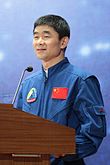 |
Liu Boming 刘伯明 * 1966 |
1998 | Shenzhou 7 | active |
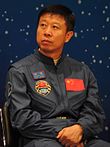 |
Liu Wang 刘 旺 * 1969 |
1998 | Shenzhou 9 |
active since 2019 ergonomics expert group |
 |
Never Haisheng 聂海胜 * 1964 |
1998 |
Shenzhou 6 Shenzhou 10 |
active since 2016 commander of the space corps |
| Pan Zhanchun 潘占春 * 1966 |
1998 | Retired in 2014 | ||
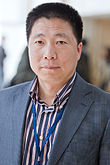 |
Yang Liwei 杨利伟 * 1965 |
1998 | Shenzhou 5 |
active since 2019 Deputy Technical Director of the manned space program |
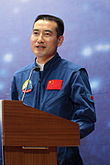 |
Zhai Zhigang 翟志刚 * 1966 |
1998 | Shenzhou 7 | active |
|
Zhang Xiaoguang 张晓光 * 1966 |
1998 | Shenzhou 10 | active | |
| Zhao Chuandong 赵传东 * 1963 |
1998 | Retired in 2014 | ||
| Cai Xuzhe 蔡旭哲 |
2010 | active | ||
|
Chen Dong 陈冬 * 1978 |
2010 | Shenzhou 11 | active | |
 |
Liu Yang 刘洋 * 1978 |
2010 | Shenzhou 9 | active |
| Tang Hongbo 汤鸿波 |
2010 | active | ||
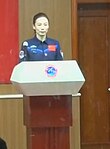 |
Wang Yaping 王亚平 * 1980 |
2010 | Shenzhou 10 |
active since 2019 ergonomics expert group |
| Ye Guangfu 叶光富 * 1980 |
2010 | active | ||
| Zhang Lu 张 陆 |
2010 | active | ||
| Major General Shen Xingyun (申 行 运) | * 1952 | 1998-2009 |
| Major General Fei Junlong | * 1965 | 2009-2016 |
| Major General Nie Haisheng | * 1964 | 2016– |
Year 2020
In connection with the modular space station , the construction of which is scheduled to begin in 2021, the manned spaceflight office and the Chinese astronaut training center started a new recruitment campaign on April 23, 2018. Unlike before, not only fighter pilots were addressed, but also engineers who were needed for the construction, maintenance and repair of the station, as well as scientists from Chinese research institutes and universities who were supposed to look after the payloads. While the early Shenzhou flights took off about every two years, the crew of the new space station is to be changed regularly every six months. Therefore, instead of 14 (1998) or 7 (2010), 17 to 18 men and women were sought for this year. So far (May 2020) it is not known whether civilians will be formally admitted to the People's Liberation Army, as the scientists working on important military projects in the mid-1970s , or whether they will be housed in other structures such as the Center for Projects and Technologies for the Use of Space . The selection process for the third year should be completed in July 2020. [outdated]
See also
Web links
Individual evidence
- ↑ 张莹: 13 年 间 中国 有 10 位 航天 员 “飞天” , 至少 6 位 都 成了 少将. In: thepaper.cn. October 16, 2016, accessed February 4, 2020 (Chinese).
- ↑ Mark Wade: Shuguang 1 in the Encyclopedia Astronautica , accessed on February 5, 2020 (English).
- ↑ 奚 启 新 、 范 炬 炜 、 刘 程: 中国 航天 员 诞生 记. In: people.com.cn. October 17, 2003, accessed February 5, 2020 (Chinese).
- ↑ 杨江华: 神舟 飞船 的 故事. Beijing Book Co., Linden 2014.
- ↑ Mark Wade: Li Qinglong in the Encyclopedia Astronautica , accessed on February 5, 2020 (English).
- ↑ Mark Wade: Wu Jie in the Encyclopedia Astronautica , accessed on February 5, 2020 (English).
- ↑ 张 素 、 李潇帆 、 朱 霄 雄: “弱冠 之 年” 的 中国 航天 员 大队 重温 誓词. In: chinanews.com. January 5, 2018, accessed February 6, 2020 (Chinese).
- ↑ 我们 的 太空: 航天 员 张晓光 的 成长 故事 …… In: zhuanlan.zhihu.com. January 12, 2020, accessed July 12, 2020 (Chinese). Includes photo of the swearing in.
- ↑ 奚 启 新 、 范 炬 炜 、 刘 程: 中国 航天 员 诞生 记. In: people.com.cn. October 17, 2003, accessed February 6, 2020 (Chinese).
- ↑ 郑国锋: 中国 航天 员 大队 首 任 大 队长 申 行 运 : 刘洋 是 中国 的 “捷列什科娃”. In: news.sina.com.cn. June 26, 2012, accessed February 7, 2020 (Chinese).
- ↑ 张 素 、 李潇帆 、 朱 霄 雄: “弱冠 之 年” 的 中国 航天 员 大队 重温 誓词. In: chinanews.com. January 5, 2018, accessed February 6, 2020 (Chinese).
- ↑ 薛艳雯 、 单 儒 超 、 李潇帆: 中国 航天 员 : 矢志 飞天 初 心 不 改. In: xinhuanet.com. January 23, 2018, accessed February 7, 2020 (Chinese).
- ↑ 奚 启 新 、 范 炬 炜 、 刘 程: 中国 航天 员 诞生 记. In: people.com.cn. October 17, 2003, accessed February 7, 2020 (Chinese).
- ↑ 杨 宸 琇 et al .: 航天 员 邓清明 : 追梦 太空 第 20 年. In: military.cnr.cn. January 21, 2018, accessed February 6, 2020 (Chinese).
- ↑ 航天 面面观: 航天 员 张晓光 晋升 少将 , 至此 , 我国 已有 7 名 航天 员 成为 将军! In: t.cj.sina.com.cn. March 15, 2018, accessed February 6, 2020 (Chinese).
- ↑ 郑国锋: 中国 航天 员 大队 首 任 大 队长 申 行 运 : 刘洋 是 中国 的 “捷列什科娃”. In: news.sina.com.cn. June 26, 2012, accessed February 6, 2020 (Chinese).
- ↑ 杨 璐茜: 杨利伟 : 中国 航天 进入 空间站 时代. In: cmse.gov.cn. March 5, 2018, accessed February 8, 2020 (Chinese).
- ↑ Peng Ying: China starts new astronaut selection process. In: xinhuanet.com. April 23, 2018, accessed February 8, 2020 .
- ↑ 陈芳允 : 卫星 上天 , 我们 测控. In: cas.cn. Retrieved February 8, 2020 (Chinese).
- ↑ 张 爽: “长 五 B” 火箭 为 中国 航天 打了个 漂亮 的 翻身 仗 , 但 精彩 未完 待续 …… In: finance.sina.cn. May 5, 2020, accessed May 5, 2020 (Chinese).
